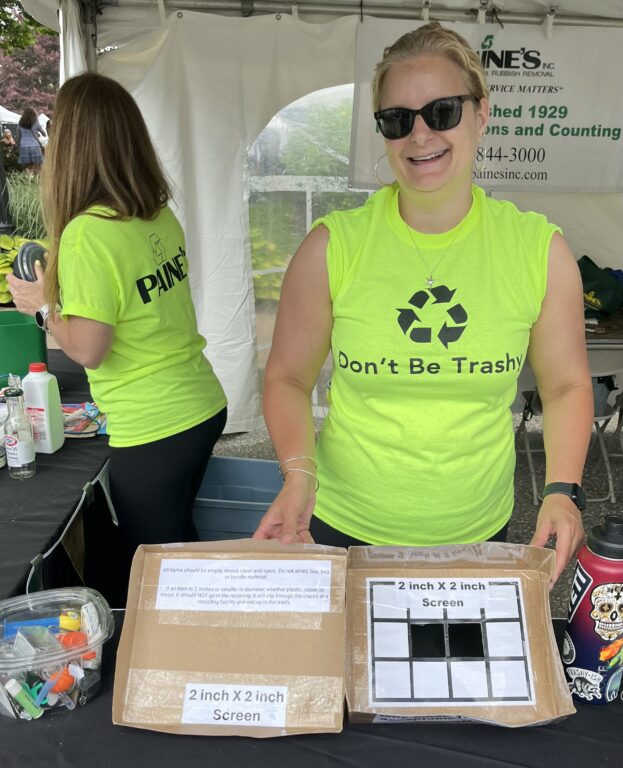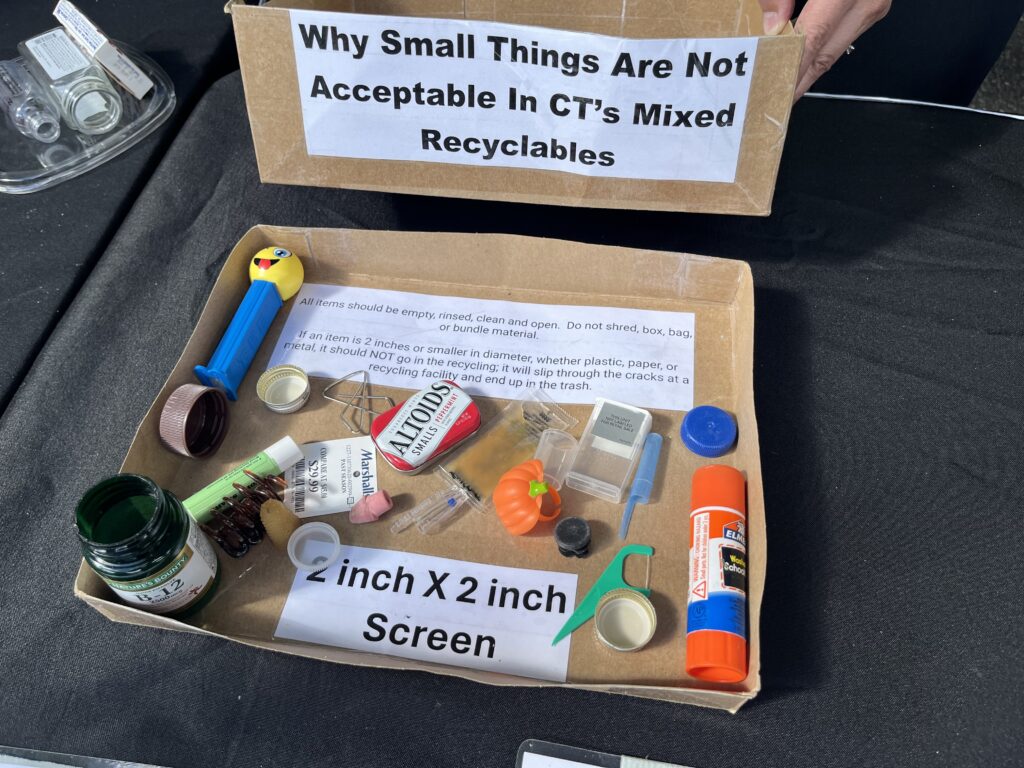Consumer Diary: Recyclable? And Scam Report

Audio By Carbonatix

Recycling rules on display at the Paine’s booth at Celebrate! West Hartford June 8, 2024. Photo credit: Harlan Levy
Consumer columnist and West Hartford resident Harlan Levy has more than 20 years of experience writing stories about everyday experiences that anyone could encounter.
By Harlan Levy
We’re veteran recyclers following what we think we know are the rules of what’s recyclable and what’s not in West Hartford.
And our town is collecting an ever increasing load of recyclables — including what shouldn’t be in the blue barrels.
Through April of this fiscal year (Oct.1-April 31) the volume of recyclables has totaled 4,571.26 tons, up 43.32 tons from the same period a year earlier, according to Todd Matt, the town’s Public Works Department’s Business Operations Manager. The percentage that’s unrecyclable is unknown, Matt said, because all of the town’s recyclables are collected via a single stream process, so there is no clear indicator of what is driving a change across the various categories (cardboard, glass, plastics, paper, etc.).

Paine’s President Julie Paine-Miller explains West Hartford’s recycling rules. Photo credit: Harlan Levy
Meanwhile, at trash-hauler Paine’s booth during the annual Celebrate! West Hartford event this past weekend I was embarrassed to learn about several items I should NOT be recycling.
Paine’s President Julie Paine-Miller pointed out that I did not know that:
- Since 2021 black plastic containers, including take-out, mushroom, and frozen food trays, and nursery/plant pots are not recyclable.
- Polystyrene foam, also called Styrofoam, has low density and very light weight which makes it unsuitable for automated sorting. Connecticut MRFs (materials recovery facilities) use automated sorting, and Expanded Polystyrene (EPS) contaminates paper and other recyclables, reducing the commodities’ value.
- Straws and little plastic caps go in the trash.
- Anything 2 inches or smaller in diameter that can fit through a 2-inch by 2-inch square hole cannot be recycled, because it slips through the cracks at the recycling facility.
- You are not supposed to shred, box, bag, or bundle recyclables.
“Everyone could use a refresher,” Paine-Miller said.

Making it clear – recycling information shared on June 8 at Celebrate! West Hartford. Photo credit: Harlan Levy
New scam survey results
A June 6 report from BBB (formerly Better Business Bureau) Scam Tracker revealed that phishing scam reports nearly doubled in 2023, hitting a record of over 9,000.
“Scammers appear to be adopting new technology and lean on text-message-based scams, including SMS text messages, phone calls, and QR codes to steal your personal information, passwords, and cash,” the report concluded.
More recently, the researchers said, scammers are “increasingly turning to SMS-based versions of these scams, sending messages meant to trick the public into clicking on links that prompt them to share personal information or download malicious software.”
Also, scammers have apparently leveraged artificial intelligence (AI) to increase their reach. Over the last year, the use of AI chatbots to craft messages has exploded, the report said.
“Discerning what’s real and what’s fake has become more difficult for the public who can no longer rely on poor grammar and misspellings as telltale signs of a scam,” BBB Scam Tracker said.
Monetary losses are staggering and almost unbelievable: Reports to the FBI’s Internet Crime Complaint Center totaled over $18.7 million stolen in 2023, the report said, citing FBI statistics.
BBB Scam Tracker also cited several individuals’ experiences:
- Brian, from West Haven, had $5,000 stolen when trying to rebook his family’s airfare. He had googled Delta’s number to reschedule, and a sponsored ad popped up with delta.com then went to a different website. When he called the stated number, a scammer said he was a Delta agent. He rebooked with extra charges, but the booking was fake.
- John, from Bridgeport said he has received hundreds of emails from a scammer pretending to be from Geek Squad, Best Buy’s computer repair service, each attempting to steal personal information. “I receive 20-50 emails a day from this address,” he said.
- Michael from Woodbury said a government imposter stole $250 from him when he tried to apply for a global entry pass, clicking on what he thought was a government site. The “service” collected his name, address, driver’s license, and criminal background history, then charged $100 for the Global Entry Fee and $149.95 for their service for the fake pass.
Generally, I’m sure you all know to go straight to the source instead of replying to a suspicious text or email, not to click on a link to pay a supposed debt, and not to reply to a request to confirm financial information regarding an unexpected problem with an account.
And, obviously, using common sense works.
NOTE: If you have a consumer problem, contact me at [email protected] (“Consumer” in subject line), and, with the power of the press, maybe I can help.
Like what you see here? Click here to subscribe to We-Ha’s newsletter so you’ll always be in the know about what’s happening in West Hartford! Click the blue button below to become a supporter of We-Ha.com and our efforts to continue producing quality journalism.



